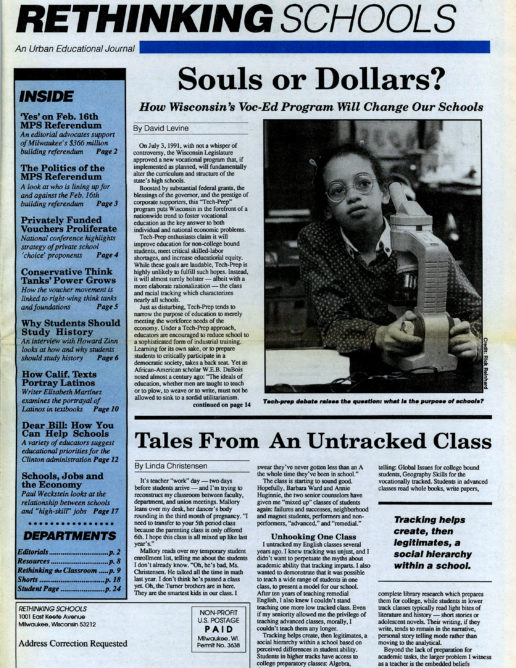‘Yes’ on Feb. 16th MPS Referendum
On Feb. 16, as few as 20,000 people might vote in a referendum that is one of the cornerstones of reform for the Milwaukee Public Schools. It is crucial that teachers, parents, and concerned community residents not only vote “yes” on the referendum, but encourage their friends, families, and co-workers to do likewise.
The referendum is to approve a bond that will finance $366 million of a 10-year, $474 million construction plan for MPS. It is the first time in almost a quarter century that Milwaukee voters have been asked to approve a comprehensive building plan for our schools (see story page 3).
The most common complaint about the referendum is that it will unreasonably raise property taxes. Yes, property taxes will rise, an average of 8% over the 10-year life of the plan. And no, no one likes to see rising property taxes.
But focusing merely on property taxes ignores two essential questions. First, what is the alternative? To do nothing and let children remain in overcrowded and inadequate classrooms — or to have no classroom space available at all, as is the case for nearly one-third of the eligible kindergartners in Milwaukee — is an untenable position. And while we must surely fight for increased state and federal monies for our public schools, those are long-term reforms that do not address the immediate crisis.
Second, why aren’t questions of property taxes and public monies used to derail city and county building projects? Why was there no hue and cry about the O’Donnell Park fiasco at the lakefront? Why no second thoughts about the public money that will be funnelled into the proposed Brewer Stadium project? Why no protests over the multi-billion dollar deep tunnel sewer project? Why no mayoral alternatives to the new County Jail?
Controversy has also surrounded the facilities plan’s proposal to contract out a growing number of seats in early childhood education to community groups. It is important, however, to remember that the referendum deals strictly with money to build and renovate schools and does not in any way earmark funds for contracting out. The confusion stems from the fact that the facilities plan, while separate from the referendum, was the basis for deciding how many schools to build and therefore how much money to request in the referendum.
We too are troubled by the contracting out proposals in the facilities plan. Will there be mechanisms to ensure accountability? What about the low wages often paid to the staff in such schools?
But the reality is that contracting out is likely to increase if the referendum fails. Without the new schools, MPS won’t have the space to educate all the city’s eligible children and will be forced to rely even more on community-based groups.
The specifics of the contracting out are vague and must be clarified. It is a struggle that needs to be fought — but after the referendum. This issue will come up again before the school board, whose very composition may be changed after the elections next spring.
Still other people are leery of the amount of money that will be used to build a new vocational technical high school and to revamp vocational education facilities in all middle and high schools. We also have serious questions about these aspects of the plan. In particular, we are concerned about the historical link between voc-ed and tracking, and question whether this issue has been thoroughly thought out at the district level. At the same time, there is no question but that Milwaukee Technical High School is an inadequate physical facility.
In the final analysis, the above reservations are outweighed by the education reforms that will be possible if the referendum is approved.
Those reforms are rarely mentioned by opponents of the referendum. Tactically, that is smart on their part. Who can be opposed to smaller class sizes and music, art, library, and computer facilities? Who could reasonably argue that Milwaukee children don’t deserve such resources even though they are found in abundance in suburban schools?
There is never any “pure” issue. Yet, despite its limitations, the facilities referendum comes about as close as any other faced by Milwaukee voters in recent years. In a very real sense, the future of our city rests on our schools and our children. Our position can be summed up in five words: “Vote ‘yes’ on Feb. 16.”

